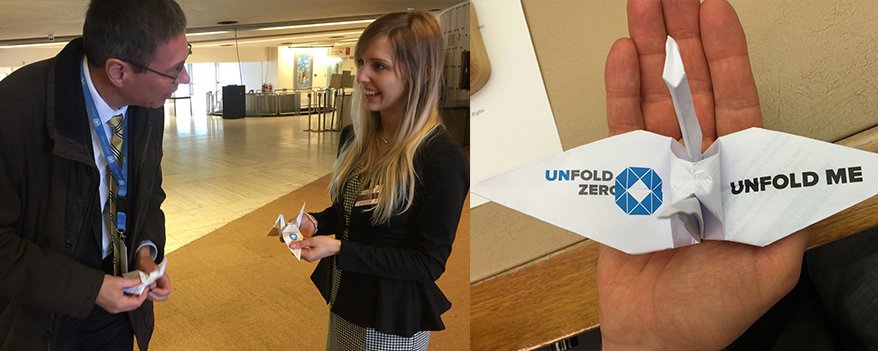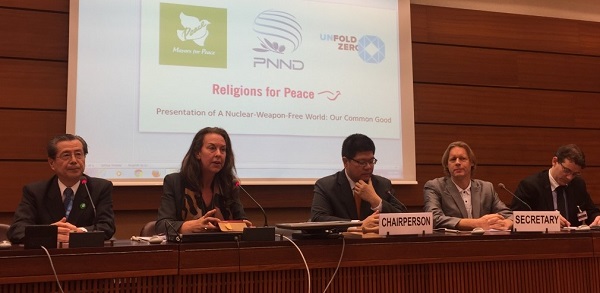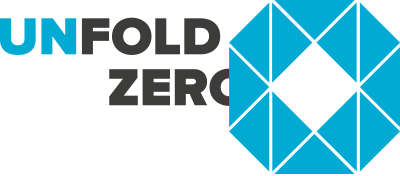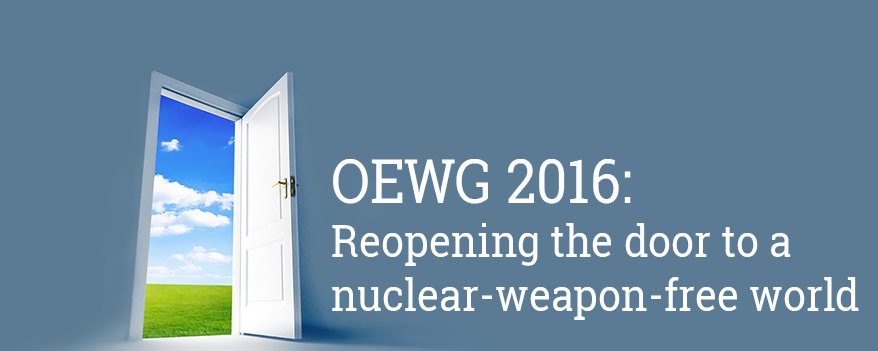From Feb 22-25, governments and civil society met at the Palais des Nations (United Nations) in Geneva for the first sessions of the UN Open Ended Working Group on Multilateral Nuclear Disarmament Negotiations.
The deliberations, chaired by Ambassador Thani Thongphakdi of Thailand, opened up a refreshing and productive dialogue between non-nuclear countries and those under extended nuclear deterrence relationships (NATO countries, Japan, South Korea and Australia). Big gaps still remain between these groups on which nuclear disarmament measures should be pursued. However, such dialogue could help in subsequent sessions (May and August) to bridge differences and move toward agreement on legal measures that should be negotiated to achieve a nuclear-weapon-free world.
UNFOLD ZERO played a key role in facilitating civil society input for the OEWG.
Civil society briefing and strategy meeting
UNFOLD ZERO organized a briefing by Ambassador Thongphakdi for civil society representatives to inform them of the agenda and process of the OEWG, including how civil society could participate. UNFOLD ZERO also organized a meeting of civil society representatives prior to the OEWG in order to discuss strategy and build cooperation.
UNFOLD ZERO presents cranes to delegates
On Monday morning, as the delegates arrived for the first session, UNFOLD ZERO presented everyone with origami cranes. The origami crane (bird) is folded from paper, and represents the hope and common interests for a nuclear-weapon-free world. UNFOLD ZERO included a message for delegates inside the crane.

We invited them to unfold the crane to read the message and then refold it back into the crane. This is quite a tricky task – much like the task of achieving a nuclear-weapon-free world. However, we encouraged delegates to persevere in both tasks (crane folding and nuclear disarmament) – and to seek the help of civil society if they ran into difficulties.
A Nuclear-Weapon-Free World: Our Common Good
UNFOLD ZERO organized a side-event on February 25 to present to Ambassador Thongphakdi A Nuclear-Weapon-Free World: Our Common Good, a joint statement by mayors, parliamentarians and religious leaders. The statement calls on governments at the OEWG to “commit to nuclear abolition, replace nuclear deterrence with shared security approaches to conflicts, and advance a nuclear weapons convention or framework of agreements that eliminate nuclear weapons.”

It has been endorsed by legislators and religious leaders from Australia, Austria, Bangladesh, Belgium, Brazil, Bulgaria, Cameroon, Canada, Costa Rica, Czech Republic, Democratic Republic of Congo, Denmark, Ecuador, Finland, France, Germany, Greece, Iceland, India, Indonesia, Ireland, Israel, Italy, Japan, Jordan, Kazakhstan, Malawi, Marshall Islands, Mauritania, Mexico, Monaco, Netherlands, New Zealand, Nigeria, Norway, Pakistan, Palestine, Portugal, Saudi Arabia, Scotland, South Africa, Spain, Sweden, Switzerland, Turkey, Uganda, United Kingdom, United States and Zimbabwe.
Statements to the OEWG
UNFOLD ZERO made two statements to the OEWG, one explaining the origami cranes and a second one making recommendations on eliminating the role of nuclear weapons in security doctrines in order to facilitate nuclear abolition. UNFOLD ZERO highlighted cooperative security mechanisms available to resolve conflicts and achieve security without the need to rely on the threat or use of force or nuclear deterrence. These include UN mechanisms for negotiation, mediation, arbitration, adjudication and enforcement of international law through collective sanctions.
See UNFOLD ZERO intervention on unfolding the path to a nuclear weapon free world and UNFOLD ZERO intervention Role of nuclear weapons in security doctrines
Campaign for the OEWG
UNFOLD ZERO launched a contest to find an idea for a global campaign to support the OEWG. UNFOLD ZERO will work with the winner to turn the idea into a campaign. And we will bring the winner to Geneva in May to promote the campaign results at the OEWG.

